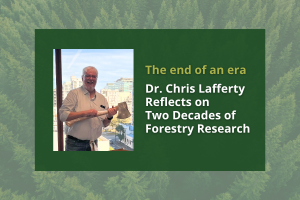Get ready for an exciting new episode of WoodChat. In Episode 31 we dive into cutting-edge research to tackle the risks posed to Australia’s forests by invasive species.
As every forester knows, biosecurity measures play a crucial role in strengthening Australia’s efforts to prevent, respond to, and recover from exotic pests and disease incursions.
Proactive steps to strengthen the industry’s response to such threats are vital for the protection of our forests, environment, communities, and economy.
The latest episode of FWPA’s WoodChat podcast series focuses on three current local research projects with the goal of strengthening biosecurity activities, not only in Australia, but also across the broader Asia-Pacific region.
Listeners will hear about the National Forest Pest Surveillance Program – also known as Forest Watch Australia. This collaborative effort between government, the forestry industry and community aims to enable early detection of exotic forest pests and improve the likelihood of their eradication. FWPA is one of a number of organisations supporting this initiative.
During the episode we caught up with Dr Lucy Tran-Nguyen, GM of Partnerships and Innovation at Plant Health Australia, which is leading this work, to find out more.
“The main objective of this initiative is to achieve national consistency in conducting surveillance at high-risk locations and surrounding areas, to target a list of exotic pests that could pose a high risk to the forestry industry and community, and ensure early detection,” Lucy said.
“At each of the target sites traps are set up to attract the pests. These traps are checked regularly, and we look at what is caught, and any necessary protective actions can then be taken depending on what is found.”
Lucy went on to discuss another FWPA-supported biosecurity project, this time involving the development of a new mobile app.
The MyPestGuide® Trees app equips all forestry stakeholders with the tools to do their bit and help minimise the damage caused to Australian forests and trees by the presence of exotic pests and diseases.
The app is designed to promote, encourage, and make it easy for everyone to get involved with reporting new potential pest sightings in high-risk areas – from professional foresters, to researchers, local government representatives, staff at parks and gardens, and citizen scientists.
Another key biosecurity project featured in the episode is working to build an effective and sustainable forest health and biosecurity network not just on our own shores, but across the whole of Southeast Asia. Listeners will hear from Dr Madaline Healey, Research Fellow at the University of the Sunshine Coast’s Forest Research Institute, who is leading this important work.
This episode is the latest in the ever-growing, intriguing WoodChat back catalogue, which encompasses a diverse array of fascinating forestry-related topics.
The most recent episodes included a two-part focus on the FWPA-supported ForestLearning education program for school children. This episode covers everything from resources that utilise the latest technologies, to award wins, and outstanding feedback from kids and teachers. Other recent episodes reported on work to create a culture of smart manufacturing for wood products in Australia, as well as efforts to model the future and help minimise the impacts of bushfire events on forestry.
WoodChat is a great example of the commitment of FWPA to embracing a wide variety of ways to ensure the industry and beyond remain up to date with the most significant developments in the forestry and wood products space. Each episode contains in-depth expert insights on some of forestry’s most exciting innovations. You can listen to WoodChat on Soundcloud, iTunes and Spotify.



